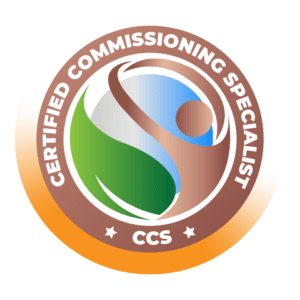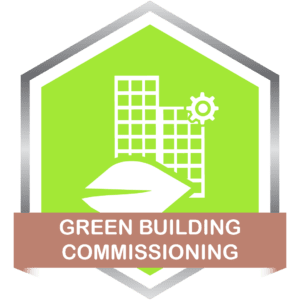About Course
Certified Building Commissioning Professional – CBCP Exam Prep Training
The purpose of the Certified Building Commissioning Professional course is to not only prepare students to take the exam and get the CBCP certification, but also to review all phases of commissioning projects and teach them the best ways to do things right now.
Building commissioning is comprised of quality-focused projects that record that building systems operate in accordance with the standards outlined in the project documentation in order to meet the operational needs of the building owners.
Such efforts have shown to be vital since buildings that do not function as well as they should have poor indoor air quality and comfort, consume more energy, and have equipment break down. Buildings that have been properly commissioned, on the other hand, have fewer modification orders, consume less energy, and cost less to run and maintain. Commissioning can also increase the productivity of older buildings by repairing, upgrading, and tuning up their systems.
The CBCP Exam Prep Training was prepared by Krishnaji Pawar, CEO and founder of Beyond Smart Cities.
This training course is intended to address the training requirements of people who need to understand the technical elements of the commissioning process, from pre-design to operations. The programme also covers the fundamental principles of both commissioning a new building and commissioning an old building, often known as “recommissioning.” The trainer walks the group through an analysis of all aspects of building commissioning, using case studies from successful projects in hospitals, data centres, airports, university campuses, school districts, commercial buildings, and more. During class discussion and a few hands-on exercises, participants are also challenged to come up with their own real-world examples.
During this long course, we will talk about all commissioning processes and categories, as described in the following sections:
- Introduction and Certified Building Commissioning Professional
- Preparing for the CBCP Examination
- Managing commissioning projects
- Preparing Commissioning Documentation
- Conducting commissioning activities
- Managing training activities
- Completing Warranty Phase Activities
- carrying out ongoing commissioning
- Conducting existing building commissioning
- CxA Essential Attributes
- Commissioning High-Performance Green Buildings
- TAB Basics
- Building Envelope Commissioning
- Commissioning Software TOOLS
- Smart Commissioning
Key Learning Objectives
After completing this course, you will be able to:
- Determine when and in what circumstances a commissioning project should be done.
- Understand the commissioning process from start to finish, including pre-design, design, construction, and occupancy.
- Discover the most effective methods for commissioning projects such as hospitals, commercial buildings, universities, data centres, and airports.
- Be aware of how commissioning interacts with other standards and design frameworks.
- Learn about the fundamental concepts underlying existing building commissioning (EBCx) and how it is applied in practise.
- Learn how commissioning projects affect building systems and O&M obligations.
- Share your personal project experiences and consider how they might be improved now that you understand more about commissioning.
- A look at commissioning software and smart building commissioning.
- More than a hundred and twenty-question CBCP Practice Exam
Building commissioning professionals ensure that new building systems are designed, installed, tested, and capable of being operated and maintained according to the owner’s intent, requirements, and operational needs. They lead, plan, coordinate and document the commissioning process on buildings such as hospitals, data centers, airports, university campuses, schools, office blocks.
They interact with commissioning teams and field personnel such as contractors, vendors, testing agencies, and auditors. They may also manage renovations, upgrades, and tune-up of systems to restore existing buildings to high productivity and improved efficiency.
AEE has qualified thousands of energy professionals over the past four decades. The U.S. Department of Energy, Agency for International Development, utilities, end users, and energy service firms recognize AEE’s certifications. When you obtain the right to use “CBCP” after your name, you demonstrate that you have the expertise needed to commission new and existing buildings. You have extensive field experience, competency, and expertise.
Other Related courses
Certified Building Commissioning Professional – CBCP Exam Question Bank
The 820-question CBCP Practice Exam with key terminology flash cards is helpful, but the Certified Building Commissioning Professional – CBCP Exam Question Bank will help building commissioning professionals create a targeted, individualized study plan to meet their professional development goals.
Our simulation exams have the following advantages:
- Assessment of knowledge before final exam.
- Similar to actual exam questions.
- Over 820+ questions in 7 mock exams.
- Understanding reasoning behind each question and answer.
- Covers CBCP Exam Knowledge Domains.
- Familiarizes with building commissioning and terminology.
- High chances of passing exam on first attempt.
- Provides direct explanation for questions.
- Includes CBCP Exam Flash Cards and CBCP_Engineering and HVAC design Equations.
Building Commissioning Professional – CBCP Overview
The Building Commissioning Professional – CBCP Overview course offers a comprehensive exploration of building commissioning, encompassing its historical background, importance, certification process, associated expenses, advantages, and sample questions from the CBCP test.
Key Learning Objectives
- Definition and history of building commissioning.
- Importance of building commissioning.
- Process overview.
- Professional certification in building commissioning.
- Cost and benefits of building commissioning.
- Summary and resources.
Course Content
Section 1: Introduction
-
08:41
-
L1. Introduction and Course Outline Handout
Section 2: CXA Basics
Section 3: CXA Guidelines and Organisations
Section 4: Preparing for the CBCP Exam
Section 5: Managing CXA Projects
Section 6: Preparing CxA Documents
Section 7: Predesign Phase CXA Process
Section 8: Design Phase CXAProcess
Section 9: Commissioning Specifications
Section 10: Construction Phase Commissioning Process
Section 11: Occupancy Phase CXA
Section 12: Managing Training Activities
Section 13: Completing Warranty Phase Activities
Section 14: CxA Essential Attributes
Section 15: Conducting Ongoing CxA
Section 16: Conducting Existing Building Commissioning
Section 17: Retro CXA
Section 18: CxA LEED Green Buildings
Section 19: TAB Fundamentals
Section 20: HVAC Project Troubleshooting
Section 21: Electrical Systems Commissioning
Section 22: Building Envelope
Section 23: Commissioning Software Tools
Section 24: Smart Building Commissioning
Section 25: Summary and Resources
iPractice Questions CBCP_Test.v1
Student Ratings & Reviews




